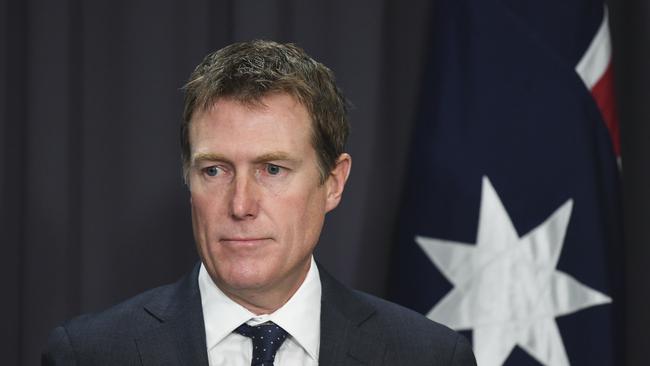Courts fail families, minister tells bench
The family law system is ‘letting down’ thousands of Australian families and must change, says the federal Attorney-General.

The structure of the family law system is “letting down” thousands of Australian families by causing confusion, delay and inefficiency, federal Attorney-General Christian Porter says, flagging major changes to the way the courts handle parenting and property disputes.
Mr Porter has also delivered a stinging rebuke to the Family Court’s judges, amid revelations of infighting, alleged bullying and a plot by judges to undermine possible court changes. The internal court ructions have occurred while families face delays of up to three years or more for their disputes to be resolved. The Attorney-General said courts did “not exist for the benefit of legal practitioners or those inside the court system, including judges”.
“No one in the wider community has much interest in or time for spats between people inside the courts’ systems,” he told The Weekend Australian. “What they care about is what really matters, which is how we reduce delays in the system for families.”
Mr Porter’s comments follow The Australian revealing that Family Court Chief Justice John Pascoe had warned judges bullying on the court would “not be tolerated”, and concerns that some appeal judges may have allowed their personal views of lower-level judges to colour their decisions.
However, the head of the Law Council’s family law section, Wendy Kayler-Thomson, yesterday said it was “scandalous” to suggest any appeal judges had made decisions based on their personal opinion of a trial judge; they decided cases “in accordance with the law and without bias”.
The Australian also revealed appeal judge Michael Kent emailed colleagues on Monday seeking their support for a constitutional challenge if rumoured plans for the Federal Court to take over family law appeals became reality. Mr Porter is expected soon to unveil structural changes to the federal courts. These could include clearer rules about which cases are handled by the Family Court and lower-level Federal Circuit Court, which both cover family law, and possible closer links between the two.
Mr Porter yesterday said the existing structure “lets down both the people who administer it as well as, and most importantly, the thousands of families that need to use the system ... Different courts with different rules and forms and processes covering essentially similar family law matters are bound to create duplication, confusion, inefficiency, delay and tension. The system itself has not allowed for the best use of highly skilled and trained legal and judicial officers”.
Mr Porter said the government wanted to “make life easier for families” during the difficult period of relationship breakdown.
Changes are expected to improve the efficiency of the Family Court’s appeal division. This could involve shifting appeals to the Federal Court, or appointing judges to both courts so they can share appeals.
However, Ms Kayler-Thomson said the community was “best served” by having specialist judges deal with family law matters.
“Cases involving child sexual abuse, family violence and the like — that’s not the diet of a Federal Court judge,” she said.
Taxpayers last year spent about $466,000 on flights and accommodation for Family Court appeal judges and their spouses to travel to hearings, or about $55,000 a judge. About 75 per cent of Family Court appeals involved three judges sitting together. In the Federal Court, three judges were used for just 12 per cent of appeals in 2016-17.



To join the conversation, please log in. Don't have an account? Register
Join the conversation, you are commenting as Logout